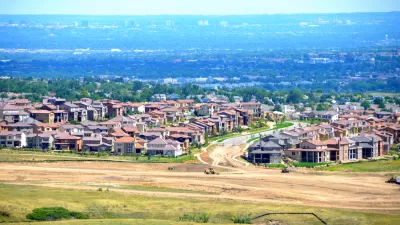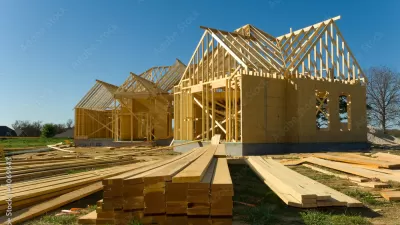The pandemic has resulted in an an increasing preference for sprawl among Americans, according to the findings of a recent Pew Research Center "American Trends Panel."

Vianney Gomez shares the findings of an "American Trends Panel" survey conducted this summer by the Pew Research Center.
"Americans today are more likely than they were in the fall of 2019 to express a preference for living in a community where 'houses are larger and farther apart, but schools, stores and restaurants are several miles away,'" writes Gomez to summarize those findings.
"There has been a corresponding drop in the share saying they would prefer to live somewhere with smaller houses that are 'closer to each other, but schools, stores and restaurants are within walking distance,'" according to Gomez.
The article provides additional insight into the demographic breakdown of the trend in U.S. housing preference. Previous trends in political preference only increased, according to the survey, but with both Republicans and Democrats increasing their preference for large homes and dispersed development:
As in the past, Republicans and Republican-leaning independents are more likely than Democrats and Democratic leaners to say they want to live in a community with larger houses even if there are greater distances to schools, shops and restaurants. Today, 73% of Republicans say this, up from 65% in September 2019. About half of Democrats (49%) now say they would prefer to live in a more widely spaced community, up from 42%.
Additional breakdowns for race, where respondents currently live, and by age are also included in the article.
The news about American housing preferences seems to be working at odds with the changes that will be necessary to prevent the worst outcomes of climate change, according to the Sixth Assessment Report published this summer by the International Panel on Climate Change. A 2019 IPCC report explicitly named U.S. land use and driving habits as a significant contributor to climate change.
The survey findings also seem counterintuitive in context of the obvious demand for city living in the United States, as evidenced by housing prices in cities and a housing affordability crisis that has only picked up pace since the pandemic began.
FULL STORY: More Americans now say they prefer a community with big houses, even if local amenities are farther away

Maui's Vacation Rental Debate Turns Ugly
Verbal attacks, misinformation campaigns and fistfights plague a high-stakes debate to convert thousands of vacation rentals into long-term housing.

Planetizen Federal Action Tracker
A weekly monitor of how Trump’s orders and actions are impacting planners and planning in America.

San Francisco Suspends Traffic Calming Amidst Record Deaths
Citing “a challenging fiscal landscape,” the city will cease the program on the heels of 42 traffic deaths, including 24 pedestrians.

Defunct Pittsburgh Power Plant to Become Residential Tower
A decommissioned steam heat plant will be redeveloped into almost 100 affordable housing units.

Trump Prompts Restructuring of Transportation Research Board in “Unprecedented Overreach”
The TRB has eliminated more than half of its committees including those focused on climate, equity, and cities.

Amtrak Rolls Out New Orleans to Alabama “Mardi Gras” Train
The new service will operate morning and evening departures between Mobile and New Orleans.
Urban Design for Planners 1: Software Tools
This six-course series explores essential urban design concepts using open source software and equips planners with the tools they need to participate fully in the urban design process.
Planning for Universal Design
Learn the tools for implementing Universal Design in planning regulations.
Heyer Gruel & Associates PA
JM Goldson LLC
Custer County Colorado
City of Camden Redevelopment Agency
City of Astoria
Transportation Research & Education Center (TREC) at Portland State University
Jefferson Parish Government
Camden Redevelopment Agency
City of Claremont





























